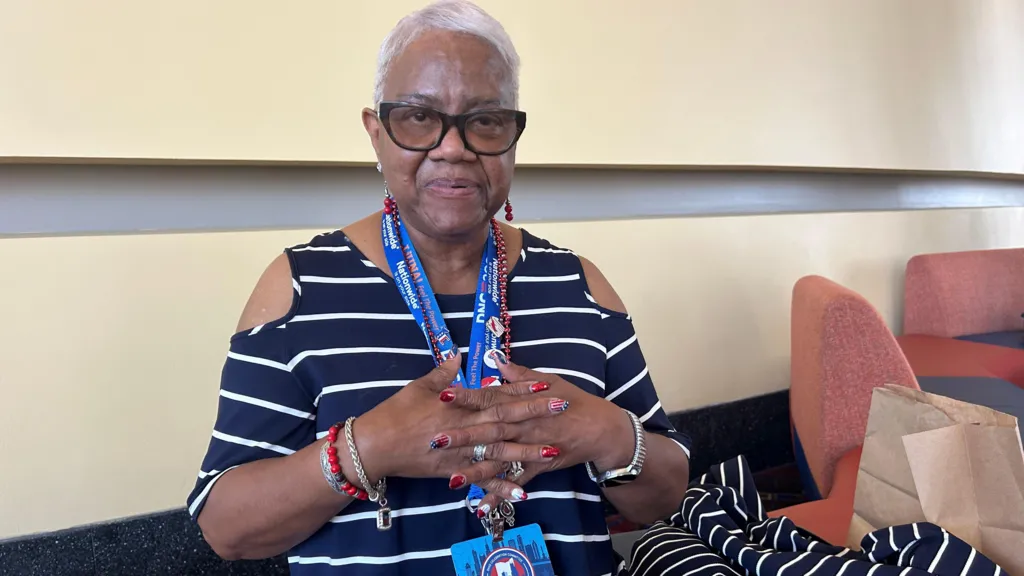Taking the stage on the opening night of the Democratic National Convention, Hillary Clinton spoke about the time she shattered one of America’s toughest glass ceilings by becoming the first woman to win a major party nomination for president.
“When a barrier falls for one of us, it clears the way for all of us,” she said, echoing her convention speech from eight years before. But while her bid for the presidency in November 2016 was historic, it ultimately ended in defeat, when she lost the election to Donald Trump.
Now, she told a crowd of thousands in Chicago, the time had come to pass the torch to Ms. Harris, as the Democratic Party takes its next shot at putting a woman in the White House. “Together, we’ve put a lot of cracks in the highest, hardest glass ceiling,” Mrs. Clinton said. “On the other side of that glass ceiling is Kamala Harris raising her hand and taking the oath of office as our 47th president of the United States.”
Times have changed since Mrs Clinton set out to become the first female president of the United States, according to several female delegates and politicians attending the 2024 DNC in Chicago.
Back then, she made her gender a central part of the campaign – a move Ms Harris has seemingly avoided. But whether the political backdrop has transformed enough for the vice-president to reach the nation’s highest office remains an open question.Mrs Clinton “shattered a lot of glass for many people”, Minyon Moore, the chair of the Democratic National Convention Committee, told reporters on Monday morning. But, she said: “It’s not easy. We’re trying to shift the mindset of people.” Women politicians and delegates who spoke to the BBC said they faced a number of barriers in politics, both in running for office and while serving their communities.
When Mallory McMorrow, a state senator from Michigan, ran for office in 2018, she remembers one woman in her district asked if she was planning on having children.
“She told me to my face, this is not a job for a mom,” Ms McMorrow said. She went on to become the second senator in Michigan history to give birth while in office. Judy Mount, the first African-American female chair of the Florida Democrats, said it took years for women to be able to serve as chairs of their state political parties. “People just do not want to see a woman in charge of anything,” she said. “They do not.”During her run for president in 2016, Mrs. Clinton fell victim to many of these same obstacles. She faced a barrage of criticisms over her appearance, her clothing and even the sound of her voice.
She came into the race with more “baggage” than the average candidate, said Deloris Hudson, an Ohio delegate to the DNC. Voters judged Mrs Clinton not only based on her own credentials and record as secretary of state but also on her relationship with her husband, former President Bill Clinton, Ms Hudson said.
Ms. Hudson said many women judged Mrs. Clinton for staying with her husband after he had an affair with Monica Lewinsky, an intern in the White House. “A lot of women felt, once the affair occurred: ‘Was she as strong a woman as she could’ve been because she stayed by her man?’” Ms Hudson said. But ultimately, it was Mrs. Clinton’s loss to Trump in 2016 that sparked women’s marches across the country and propelled a record number of female candidates to run for office in 2018. Now, 28.5% of the House of Representatives is female, compared to just 19.1% in 2017, according to the Pew Research Center.
Meanwhile, over the past decade, the percentage of Americans who believed men were better suited for politics than women fell continuously, according to data from the University of Chicago’s National Opinion Research Center. Several elections later, Ms. Harris does not face the same pressure as Mrs. Clinton to be “everything to every woman”, Ms. McMorrow said.
“Since then, we've seen more women running and winning at every single level all the way up that allows us more freedom and flexibility to be ourselves,” she said.
— CutC by bbc.com


